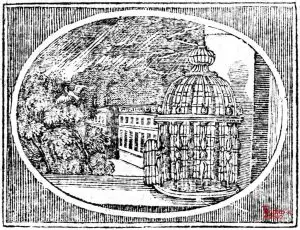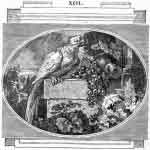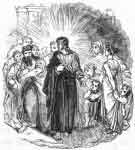A Parrot from the Indies was made a favorite. Asked why he was treated well, he said that at home he was common; here he was a rarity.
The rare may be common and the common may be rare.

Samuel Croxall (The Parrot and his Cage)
A PARROT, which belonged to a person of quality, was fed every day with plenty of choice dainties, and kept in a stately Cage, which was set abroad, upon a marble table, in the garden, that he might enjoy the light of the sky. and the freshness of the air, to the best advantage. His master, and all the family, when they talked to him, used the most tender, fond expressions, and the disorder of his feathers was smoothed with kindly touches, by the fair hand of his lady. Yet, notwithstanding this happy situation, he was uneasy, and envied the condition of those birds who lived free in the wilderness; and hopped up and down, unconfined, from bough to bough He earnestly longed to lead the same life, and secretly pined, with grief, because his wishes were denied him. After some time, however, it happened that the door of his cage was left unfastened, and the long wished for opportunity was given him of making an elopement. Accordingly, out he flew, and conveyed himself among the shades of a neighbouring wood, where he thought to spend the remainder of his days in content. But, alas! poor Poll was mistaken; a thousand inconveniences, which he never dreamt of, attended this elopement of his, and he is now really that miserable creature which, before, his imagination only made him. He is buffeted by the savage inhabitants of the grove; and his imitation of a human voice, which formerly rendered him so agreeable, does but the more expose him to the fierce resentment of the feathered nation. The delicate food with which he used to be fed, is no more; he is unskilled in the ways of providing for himself, and even ready to die with hunger. A storm of rain, thunder, and lightning, fills all the air, and he has no place to screen or protect him; his feathers are wetted with the heavy shower, and blasted with the flashes of lightning. His tender nature, suited to a milder climate, could not stand the severe shock; he even died under it. But, just before he breathed his last, he is said to have made this reflection: Ah, poor Poll! were you but in your own Cage again, you would never wander more.
THE APPLICATION
This fable may be a proper lesson to those who are possessed with a spirit for rambling, and trying experiments; who are so infatuated with these airy notions, that though they have a warm house over their heads, and a good table to eat at, kind indulgent parents, or fond husbands, yet they cannot be contented, but must sally forth into the wild world, and pass, as it were, into a new and untried being. People may have felt imaginary inconveniences at home; but as they have been used to live in a dependance upon others, let them but go abroad, and try to shift tor themselves, and they will, in all probability, soon feel real miseries. No ship puts to sea without an experienced pilot; nor do armies take the field, but under a general of conduct and courage; yet some women and children are so perverse and wrong-headed, that they will leave a quiet, safe port, and launch out into a world of troubles and dangers, without the least share of discretion to steer their course by. How can they hope to escape splitting upon every rock, who are thus rash and adventurous? A severe repentance, after such elopement, is generally as certain as it is useless and unregarded.

Northcote
A Parrot brought from the Indies, the native country of those birds, was made a great favorite of, had a cage of ivory, with silver ornaments, was fed with the choicest dainties, and held in high esteem. When it was demanded of him, what was the reason he was treated with so much more respect in this country, than he was in his own native place: he answered, “You are not to marvel at it, as here I am a rarity and wonder; there I am common and familiar, and therefore thought but of little value.
Application
Nothing is truer than that proverb in the sacred writ, “That a prophet lacketh not honour, save in his own country, and from his own kindred.”


